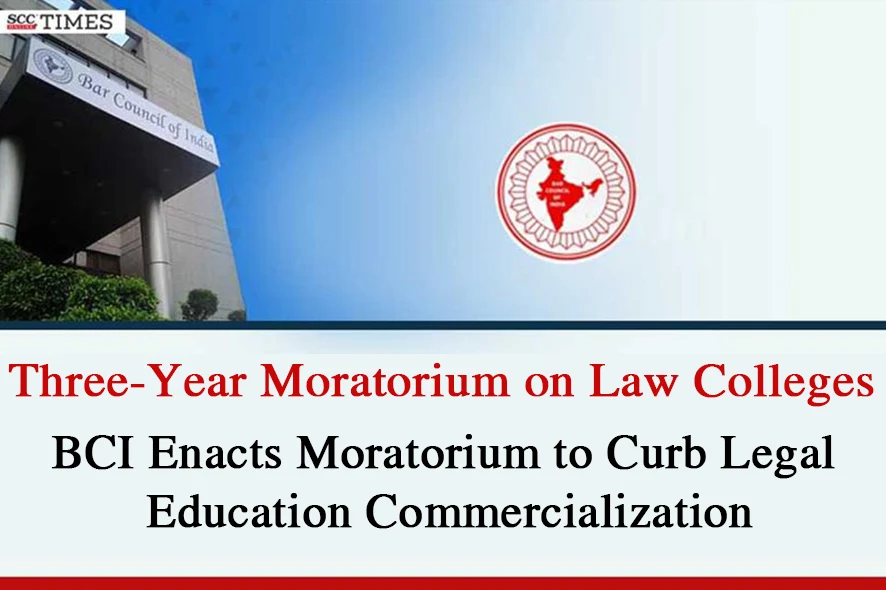On 13-8-2025, the Bar Council of India (‘BCI’) issued Rules regarding Legal Education Moratorium (Three-Year Moratorium), marking a significant move in the regulation of legal education across the country. These Rules impose a complete ban on the establishment of new law colleges, Centers of Legal Education (‘CLEs’), for a continuous period of three years.
Key Highlights of BCI’s 3-Year Moratorium on Law Colleges-
- The BCI formally approves the Rules of Legal Education, 2025, applicable to all CLEs.
- These Rules will be published shortly and remain in force for three years from the date of implementation.
- For the duration of the moratorium, any new CLE is not permitted to be established anywhere in India. Existing CLEs are prohibited from introducing:
- New sections
- New courses
- Additional batches
- The BCI clarifies that new proposals will not be approved, and pending applications submitted after implementation will not be considered.
- This move reflects a deep concern over the declining standards of legal education.
- The BCI cites the unchecked proliferation of substandard institutions, routine issuance of No Objection Certificates (NOCs) by State Governments, and affiliations granted without proper inspection as key reasons for this intervention.
- With nearly 2000 CLEs already operational, the Council believes that India’s institutional capacity is sufficient and that the focus will now shift to quality enhancement, systemic strengthening, and consolidation.
- The BCI aims to curb commercialization, address faculty shortages, and eliminate academic malpractice that has plagued the sector.
- The moratorium draws its authority from Sections 7, 7(1)(h), 7(1)(i), 24(1)(c)(iii), and 49(1)(af), (ag), and (d) of the Advocates Act, 1961.
- This policy follows a sustained course of action undertaken by the Council, including a 2019 resolution imposing a temporary moratorium, judicial proceedings culminating in the judgment of December 4, 2020 by the Punjab and Haryana High Court, and a detailed press statement issued on June 16, 2021 urging rigorous diligence by State Governments and universities.
- The present Regulation answers the Court’s guidance by enacting the measures through formal rules and reinforces the Council’s long-standing commitment to quality.
- Before any new law college can be officially approved, it will be required to go through a strict 3 stage process designed to ensure quality and necessity:
- Government NOC- The State Government or Ministry will be required to confirm there’s a genuine need for a new law college in the area.
- University Affiliation- The affiliating university will ensure if the college meets all basic standards, like infrastructure, faculty, and funding, stated under the Rules of Legal Education, 2008.
- BCI Inspection- Finally, the BCI will inspect the college, afterwards approval will be granted only if everything meets national legal education standards.
- The Rules provide limited exceptions for proposals that serve socially and educationally backward classes, Scheduled Castes (SCs), Scheduled Tribes (STs), Economically Weaker Sections (EWS), and persons with disabilities.
- The proposals from statutory universities or those recommended by authorities will be given consideration only if they meet stringent eligibility criteria and receive prior written approval from the BCI.
- During the moratorium, existing CLEs will undergo intensified inspections and compliance audits.
- The Law colleges that fail to maintain expected standards can face closure, derecognition, or withdrawal of BCI approval.
- All the degrees issued in violation of the Rules will be deemed invalid, and graduates from such law colleges will be barred from getting enrolled as an advocate under Section 24 of the Advocates Act, 1961.
- With these regulation law students, the BCI promises a more credible and rigorous legal education system, where institutions are held accountable and degrees carry genuine professional value.
- In the long run, this significant step will elevate the prestige of the legal profession, improve career prospects, and reinforce public trust in the justice system.
- The BCI will review the impact of the moratorium annually and will therefore make necessary extension, modification, or omission, based on evolving circumstances.
- The BCI expects full cooperation from all stakeholders in upholding the objectives of the Regulation.
- Through this notice BCI issues a warning to non-compliant institutions and authorities. It states that failure to adhere to the Rules can result in:
- Disciplinary proceedings
- Civil liability
-
Criminal prosecution
The Bar Council of India is the statutory body responsible for regulating legal education and the legal profession and this landmark move is aimed at reshaping the landscape of legal education in India. For law students and aspirants, this development is more than just administrative news it’s a signal of the changing tides in legal academia.
While the moratorium temporarily restricts admission opportunities, it marks a decisive shift toward quality-driven legal education. For students and aspirants, this reform promises degrees of genuine professional value and institutions held to rigorous standards.


